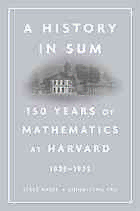
A history in sum : 150 years of mathematics at Harvard (1825-1975) PDF
Preview A history in sum : 150 years of mathematics at Harvard (1825-1975)
A HISTORY IN SUM A History in Sum 150 YEARS OF MATHEMATICS (1825–1975) AT HARVARD Steve Nadis and Shing- Tung Yau Harvard University Press Cambridge, Massachusetts London, En gland 2013 Copyright © 2013 by the President and Fellows of Harvard College All rights reserved Printed in the United States of America Library of Congress Cataloging- in- Publication Data Nadis, Steven J. A history in sum : 150 years of mathematics at Harvard (1825– 1975) / Steve Nadis and Shing- Tung Yau. pages cm Includes bibliographical references and index. ISBN 978- 0- 674-7 2500- 3 (alk. paper) 1. Mathematics— Study and teaching— Massachusetts—History. 2. Harvard University. Dept. of Mathematics. I. Yau, Shing- Tung, 1949– II. Title. QA13.5.M43H376 2013 510.71'17444—dc23 2012049485 To Harvard mathematicians— past, present, and future— and to mathematicians everywhere who have contributed to this beautiful subject. CONTENTS Preface ix Prologue: The Early Days— A “Colledge” Riseth in the Cowyards 1 1 Benjamin Peirce and the Science of “Necessary Conclusions” 7 2 Osgood, Bôcher, and the Great Awakening in American Mathematics 32 3 The Dynamical Presence of George David Birkhoff 56 4 Analysis and Algebra Meet Topology: Marston Morse, Hassler Whitney, and Saunders Mac Lane 86 5 Analysis Most Complex: Lars Ahlfors Gives Function Theory a Geometric Spin 116 6 The War and Its Aftermath: Andrew Gleason, George Mackey, and an Assignation in Hilbert Space 141 7 The Eu ro pe ans: Oscar Zariski, Richard Brauer, and Raoul Bott 166 Epilogue: Numbers and Beyond 204 Notes 211 Index 241 PREFACE An esteemed colleague in our department recently asked about the moti- vation for writing a book about the history of mathematics at Harvard. He didn’t see the history of our department—o r of any department, for that matter—a s constituting a worthy end in itself, or at least not wor- thy of a book. “I don’t see history as an end,” he said. “I see it as a means. But if it’s supposed to be an end, you really ought to explain why you consider it important and something that others, outside of this place, might actually fi nd interesting.” I must admit to being taken aback by his remarks, as I had pretty much assumed from the get- go that the topic was, without question, meritorious. But as the person who initiated this project— at a time when I was still the department chair—I am grateful that he asked, since it forced my coauthor and me to think long and hard about the book’s premise. After a good deal of refl ection on this matter, I must take issue with my esteemed colleague, for in the tales of Harvard mathematicians over the years and de cades, I see both a means and an end. First, there’s the potential educational value in reading about the remarkable feats of remarkable people—p eople who at various junctures in history did in- deed change the course of mathematics. Second, there are some very good stories here— stories that deserve to be told about individuals who came to mathematics through varied and singular routes, in some cases overcoming considerable adversity to pursue their respective callings. But beyond that, I truly believe that good mathematicians (as well as good scientists in general) really need to understand their origins. By looking at the contributions of the great men and women from the past, we can trace a path showing how the important ideas in math evolved. And by looking at that path, we may gain helpful clues regarding avenues ix
